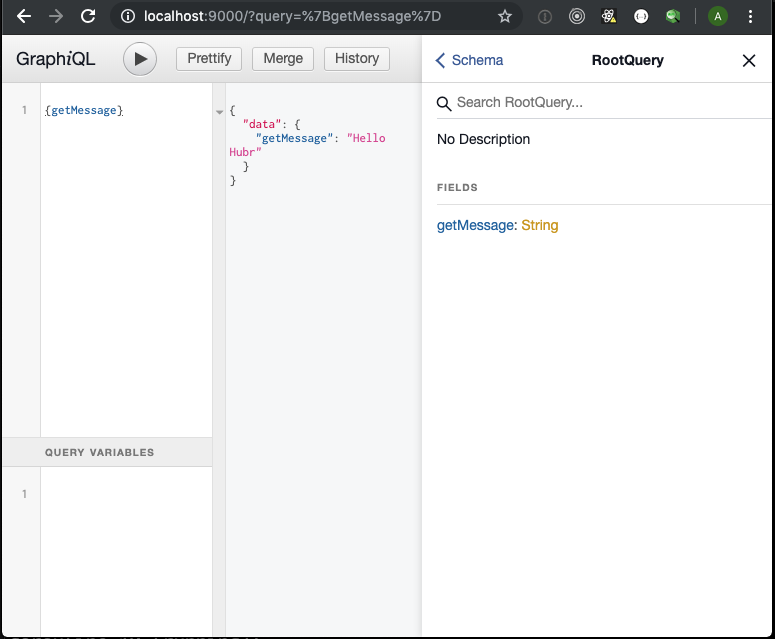Make on go GraphQL API
1. Add graphiql client to go project

Graphiql is an interactive GraphQL browser client.
To use it in a go project, you need to add an html page with several dependencies.
If you need to have the latest versions, it will help to install node and packages. The project will grow greatly. There is an option to collect HTML into one go file and pull up dependencies with cdn at startup.
My version of go-graphiql .
To work, you need to add only:
http.HandleFunc("/cli", graphiql.ServeGraphiQL)The result is:

2. Let's see how the API works in terms of the browser
In the browser, open the developer console and add the js code:
let q=`{getMessage}`
let v={}
let options = (query, variables={}) =>{
return {
method: 'POST',
headers: {
Accept: 'application/json',
'Content-Type': 'application/json',
},
body: JSON.stringify({ query, variables }),
}
};
let o = options(q, v)
console.log(o)
fetch("http://localhost:9000/graphql",o)
.then(response=>response.json())
.then(console.log)Execution Result:
There is an error in the API. It is necessary to change the text of the message.
q=`mutation {
setMessage(msg: "Hello Habr")
}
`
v={}
o = options(q, v)
console.log(o)
fetch("http://localhost:9000/graphql",o)
.then(response=>response.json())
.then(console.log)Execution Result:
3. Let's see how it works from the point of view of the server.
The workflow is described by the object:
schema, err := graphql.NewSchema(graphql.SchemaConfig{
Query: types.RootQuery,
Mutation: types.RootMutation,
})Query
Data retrieval
var RootQuery = graphql.NewObject(graphql.ObjectConfig{
Name: "RootQuery",
Fields: graphql.Fields{
"getMessage": &graphql.Field{
Type: graphql.String,
Resolve: func(p graphql.ResolveParams) (interface{}, error) {
msg := logic.GetMessage()
return msg, nil
},
},
},
})
The Resolve function gets data for us. Data can be from any source from the Database to the micro controller
Mutation
Data mutation
var RootMutation = graphql.NewObject(graphql.ObjectConfig{
Name: "RootMutation",
Fields: graphql.Fields{
"setMessage": &graphql.Field{
Type: graphql.String,
Args: graphql.FieldConfigArgument{
"msg": &graphql.ArgumentConfig{Type: graphql.NewNonNull(graphql.String)},
},
Resolve: func(p graphql.ResolveParams) (interface{}, error) {
msg := p.Args["msg"].(string)
logic.SetMessage(msg)
return msg, nil
},
},
},
})Editing data also occurs using the Resolve function.
Resolve can also create light events or adjust the temperature.
An interesting point is that the type of returned data can also have graphql.Fields which will also have their own Resolve functions.
4. Typed languages?
There are some restrictions (features) of data exchange.
In go, variables have default values.
Int is 0, String = ""
In graphql, there may be a situation when a variable is not set.
Therefore, for such parameters we use a link to a variable
In continuation,
I will write how to make graphql api to the Open Data Registry.
Because programmers are the most lazy people on the planet. We will do the API so that we do something less.
TODO:
Api starter kit
schema
There is an interesting project that creates a scheme for the text.
func main() {
s := `
schema {
query: Query
}
type Query {
hello: String!
}
`
schema := graphql.MustParseSchema(s, &query{})
http.Handle("/query", &relay.Handler{Schema: schema})
log.Fatal(http.ListenAndServe(":8080", nil))
}github.com/graph-gophers/graphql-go
resolv
I will make a generator for fields by structures
query
did not figure out how to build queries with a generator
